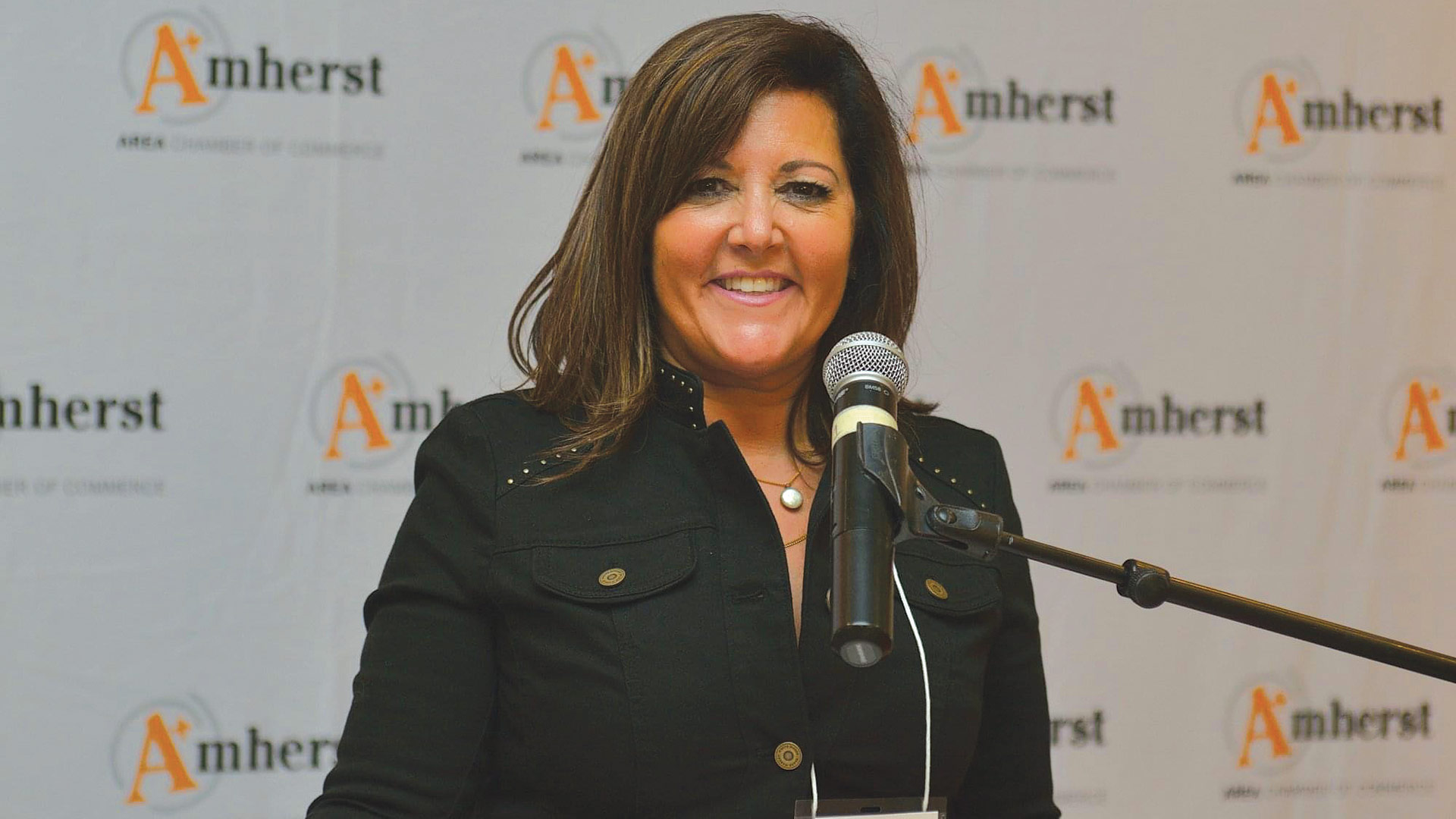Community Spotlight
By Mark Morris

Paul Bockelman said he’s worked with chamber and BID leaders to address the urgent needs of the business community during the pandemic.
Epictetus, the Greek philosopher, first made the observation, “it’s not what happens to you, but how you react to it that matters.”
While Epictetus did not live in Amherst, town officials and business leaders there have certainly adopted the philosopher’s adage in their robust efforts to return the town to vitality in the face of a pandemic.
Last March, when COVID-19 began to affect life in communities everywhere, Amherst took a broader hit than most because UMass Amherst, Hampshire College, and Amherst College all shut down earlier than other area institutions.
Gabrielle Gould, executive director of the Amherst Business Improvement District (BID), said the suddenly empty campuses posed a shock to the system.
“We lost 40,000 people in a 48-hour period,” she recalled. “It was like turning off a light switch.”
With college closings and retail activity coming to a screeching halt, Amherst Town Manager Paul Bockelman said his town lost its two major industries because of the pandemic. Still, he noted, “despite all that, the town has been resilient, and we are prepared to emerge from the pandemic in a very strong way.”
Early on, Amherst quickly mobilized a COVID-19 response team as Bockelman and the department heads of the Police, Fire, Public Works, and other departments met daily to strategize, he explained. “We prioritized the health of our workforce because we wouldn’t be able to help residents if our fire, police, and DPW staff weren’t healthy.”
The next priority was to maintain continuity of government functions. Amherst migrated town staff to remote work and incorporated Zoom meetings to assure key bodies such as the Town Council and the School Committee could keep moving forward. Permit-granting committees soon followed.
“We prioritized the health of our workforce because we wouldn’t be able to help residents if our fire, police, and DPW staff weren’t healthy.”
As plans were coming together to allow outdoor dining, the Town Council passed a special bylaw to delegate simple zoning decisions to the building commissioner. This move sped up the permitting process and cut down on much of the bureaucratic red tape.
“For example, permits for serving alcohol outdoors or expanding the footprint of a restaurant could be done through one person instead of going through an often-lengthy permitting process,” Bockelman said.
To address the urgent needs of the local business community, he also met weekly with Gould and Claudia Pazmany, executive director of the Amherst Area Chamber of Commerce. The BID and chamber share office space on Pleasant Street, so Pazmany and Gould worked together to learn about the many grants available to local businesses impacted by COVID-19. The main goal was to help owners stay in business.

Claudia Pazmany says one of her most important roles has been helping business owners navigate the grant system.
“We knew that closing their doors would mean closing their doors forever,” Pazmany said. “That’s what we were trying to avoid.”
Granting a Reprieve
Before the pandemic, the chamber would host 56 events in a typical year. Pazmany said she quickly moved to digital events to keep everyone together. “We went from 56 events to 56,000 connections on Facebook and other social media.”
More importantly, in addition to helping local businesses apply for the federal Paycheck Protection Program (PPP), Gould and Pazmany have successfully secured grant programs at the state and federal level.
A number of Amherst businesses received grants through the state COVID-19 Small Business Grant Program, which provided a total of $668 million for Massachusetts businesses. Amherst also secured $140,000 in federal Community Development Block Grant funds for local businesses.
State Sen. Joan Comerford helped the Chamber and BID to fund the recently formed Relief and Resiliency Microgrant Program. Originally designed to provide $500 microgrants, Pazmany said they were able to secure matching dollars, so $1,000 grants will soon be awarded to 18 of Amherst’s small-business owners in the first round of the program.
“The microgrant money will help defray some costs and allow people to keep going,” she said. “Many of these business owners are not even paying themselves; they just want to pay their bills.”
One of the more important roles Pazmany and Gould have taken on involves helping business owners navigate the grant system. Whether it’s identifying eligible funding, helping to fill out forms, or solving technical issues, Pazmany said they are not limiting their support to just chamber members. “Right now, it makes no difference if you are a chamber member or not. If you need help and you cross our threshold, we will help you.”
While outdoor dining and takeout have enabled restaurants to keep their doors open, the BID launched an effort to do more, buying meals from local restaurants and giving them to families in need. The effort began two months ago with the moniker December Dinner Delights and recently received funding to continue through April. Gould sees this as a win-win.
“We pay the restaurants $1,500 twice a week to help them sustain business, and we provide meals for families in our community,” she noted.
Another effort to support local business involves a gift-card program run by the chamber. Launched at the beginning of the holiday season, the gift cards can be redeemed at more than two dozen local businesses, from restaurants to a cat groomer. Pazmany said she has had to reorder cards to keep up with demand. “It works because you are able to give someone a gift and, at the same time, support a small business; it’s the best type of reinvestment in our community.”
As for town-run programs, last spring, municipal leaders had to figure out what to do about the farmers’ market it runs every Saturday from April through November. In the past, it was held in a cramped parking lot that would not conform to social-distancing protocols. Because the town common had no activities scheduled, the farmers’ market set up there — and had its most successful year ever.
“Right now, it makes no difference if you are a chamber member or not. If you need help and you cross our threshold, we will help you.”
“Our town common is a bucolic setting, and people who were cooped up all week could safely come and buy things,” Bockelman said. The manager of the farmers’ market reported the average sales week in 2020 equaled the best sales week in 2019, and the booths sold out of their products every week.
The farmers’ market was a highly visible way to revitalize interest in Amherst, as are continuing “quality-of-life developments,” as Bockelman called them, such as the newly opened Groff Park and the building of a new playground at Kendrick Park.
But smaller acts, like making picnic tables available in parks and other public places, were popular as well, he added. “As soon as we put out the tables, people were immediately using them. It was awesome.”
Forward Thinking
Looking to the future, Amherst is making decisions on four major capital projects slated for construction in 2022. On the drawing board are a new elementary school, a new library, a new Public Works facility, and a new fire station.
“We are trying to incorporate these projects into our ongoing budget so the taxpayer does not have to take on too much of a burden,” Bockelman said.
The desirability of Amherst as a place to live keeps housing prices high, which he calls a two-edged sword because it hurts the town’s ability to build a diverse socioeconomic community.
“People value diversity in Amherst,” he said. Still, he added, “it’s much more diverse than most people realize, especially our school district.”
To deepen that diverse profile, Amherst is looking to invest in property to develop more affordable housing. Bockelman pointed to a recently approved development on Northampton Road and a potential land purchase on Belchertown Road as additional projects in the works. “The town is willing to make the investment to develop and retain affordable-housing units in Amherst.”
To better address diversity in business, the chamber makes available an open-source document for proprietors who want to identify their business as being run by a woman, minority, or LGBTQ individual.
Pazmany said it’s simply good for business, noting that “we are getting steady requests from people who want to do business with various self-identifying businesses.”
Amherst at a Glance
Year Incorporated: 1759
Population: 39,482
Area: 27.7 square miles
County: Hampshire
Residential Tax Rate: $21.82
Commercial Tax Rate: $21.82
Median Household Income: $48,059
Median Family Income: $96,005
Type of Government: Town Council, Town Manager
Largest Employers: UMass Amherst; Amherst College; Hampshire College
* Latest information available
One element in the town’s strategy emphasizes Amherst’s potential as a tourist destination. Several national news articles have suggested that this decade may become a second “roaring 20s” with a renewed emphasis on cultural attractions. If that’s so, Pazmany pointed out, Amherst has plenty to offer, such as Museums10, a collaborative of 10 area museums, of which seven are located in town. Together, the museums cover various aspects of history, art, literature, and the natural world.
“In a normal year, Museums10 will bring more than a half-million people to the area,” she said. “The Emily Dickinson Poetry Festival itself is a global event.”
For the more immediate future, the plan is to have outdoor dining up and running by April 1. The BID was able to supply enough table umbrellas and heaters during the summer to boost last year’s effort. Because there are so many barriers in place to ensure safe outdoor dining, the BID also paid 35 artists to turn the plain concrete into a medium to express themselves.
“The barriers became nice displays of public art, and they give downtown a bit of an art-walk feel,” Gould said.
Simple touches like the artwork and adding planters around town generated positive comments from visitors and business owners alike. Pazmany appreciated the boost of confidence. “In this next phase, we just want our businesses to be up and running so they can take a paycheck and start to rehire people.”
Most Amherst leaders, in fact, look to the coming year with great anticipation. Bockelman noted that the town has several fundamental strengths, including the university and colleges. Pazmany added that UMass has already reported an increase in enrollment for the coming fall.
Gould admits that pushing forward on grants and other relief efforts helped Amherst through the worst of the pandemic. “Despite how hard everyone was hit, we’ve created a resiliency that kept our businesses here.”
Bockelman agreed. “Everyone’s efforts worked because they were sequential and were patiently done. We just kept moving forward.”
Epictetus would be proud.






